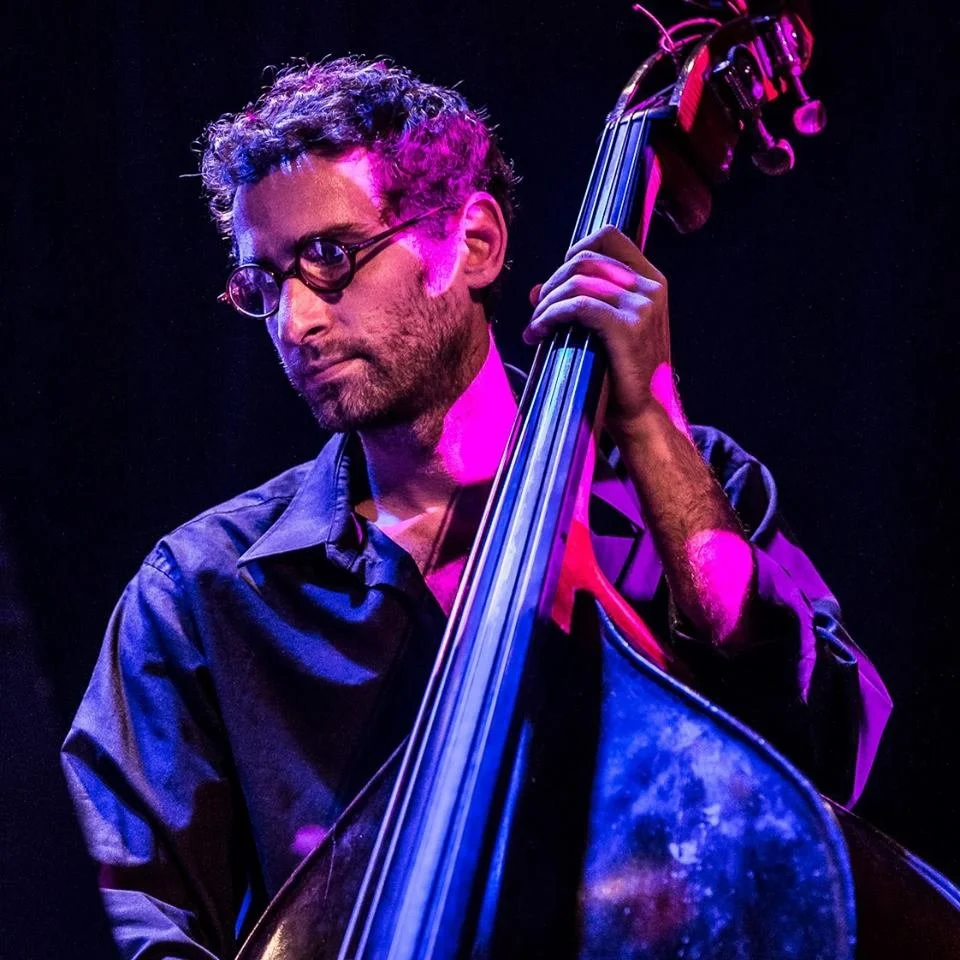
Prolific New York City composer and performer Doug Balliett is premiering a thrilling new piece at “Multiphonics” at Le Poisson Rouge. This exciting concert on October 11th will feature Doug’s new cantata inspired by the texts of Cleopatra’s death performed by his twin brother Brad on bassoon, as well as the brilliant and accomplished mezzo-soprano Majel Connery. Doug is attracted to cantatas for their condensed story telling ability like a “bite-sized” opera. When asked to compose a work with a solo bassoon, a Cleopatra Cantata came naturally to him.
His musical influences come from a large range of styles from early music, rap to rock. Balliett attracts diverse audiences with performances of his solo works at Lincoln center to his full-scale hip-hopera in Lucerne! His compositions have been critiqued as “brilliant and witty” (New York Times) and “weird in the best possible way” (I Care if You Listen). As a double bassist, he has performed as solo or principal bass with Ensemble Modern, the San Antonio Symphony, the Metropolis Ensemble, Alarm Will Sound, Talea Ensemble, Contemporaneous, Ensemble ACJW, NOVUS, Trinity Wall Street Baroque Orchestra, Handel & Haydn Society, Arcadian Players, Pink Martini and many more.
In preparation for the “Multiphonics” contemporary bassoon concert at Le Poisson Rouge, Doug Balliett, talks to us about his new cantata that will be performed at Multiphonics. He offers rare insight in to what it’s like to compose for his twin brother Brad, and his experience with working with Metropolis Ensemble. Doug Balliett’s cantata has been described as, “blowing up the idea of a concerto to include a mezzo-soprano, turning it into a song cycle at the same time” (Brad Balliett)
Some general thoughts:
“There’s something about a cantata that really appeals to me; the drama, the length, the infinite ways to arrange the pieces. Cantatas are like bite-sized operas, condensing what humor and pathos are in a story into a work about the length of one side of a pop LP. Brief, varied, dramatic. I’ve been playing Bach sacred cantatas on a weekly basis for a couple of years, and absorbing what I can of his limitless formal and textural invention. Long wanting to set the story of Cleopatra’s death as cantata, it was the first thing that came to mind when Metropolis asked me about writing a work with a solo bassoon part. Cleopatra cantata with obbligato bassoon? Sounds awesome to me. “ (Doug Baillett).
Tell us about the texts and what drew you to them? How are you going about setting them, working with Majel, and also weaving in the bassoon?
Probably my favorite primary document from Roman history is Suetonius, whose 12 Ceasars reads like a comic book. He presents a very three-dimensional picture of Cleopatra, which can be broadened further by reading contemporary research. She is not the way we imagine her today, except maybe that she usually gets what she wants. I wrote the texts for these songs after spending some time imagining the events of her life, but focusing on the much romanticized last few hours. I think Majel, our singer, will be perfect for the role. Majel brings an expressive quality to a line that absolutely animates it, and I try to imagine her voice when I’m writing. It’s a great opportunity to write straightforward music, knowing it’ll be interpreted beautifully.
What is it like to write a piece for your twin brother?
It’s a bit of a two-edged sword, really: on the one hand, I know his playing well. I know the kind of things he does easily and expressively and I’ve learned a few very bassoon-y facts about what works and what doesn’t on the instrument. Sometimes bassoonists tell me they like my writing for the instrument, and I figure that’s why. On the other hand, he’s my favorite bassoonist and capable of quite a bit more than I’m even aware, and I sometimes worry I’m not exploiting his full potential. I wish I could download all bassoon technique into my brain so I could really make him work.
How does being a bass player and a student of baroque techniques influence your compositional style?
I learned so much from studying baroque music, and I feel like it’s constantly seeping into my style. It isn’t that I’m writing in a baroque style, at all, but what I really love about baroque music is that it is driven by a continuo group, playing creatively and rhetorically. I love playing continuo, to me it’s as satisfying as a well honed rhythm section, and lately I’ve been writing more and more with a continuo group in mind. The best is recitative, when the continuo really gets to unleash. Why is there so little recit being written today?
How long have you been involved with Metropolis and is your first composition with them? What other projects keep you busy or that you’re currently working on?
Andrew Cyr was very kind to me when I was considering moving to New York. I talked with him on the phone and he encouraged me to follow my heart and let the pieces fall where they would. Metropolis was among the very first gigs I took in New York, and it’s amazing a few years later to be joining their incredible roster of composers. I don’t think I’ve ever had a full piece on a Metropolis program, though I did orchestrate part of Brad’s hip-hopera (The Rake) that we performed on the MATA festival a few years ago. I’ve played bass on many programs with Metropolis, which is always a treat for me. I can’t wait to hear my piece played by this amazing group, along with all the other new bassoon music!
post by: Sequoia Sellinger

